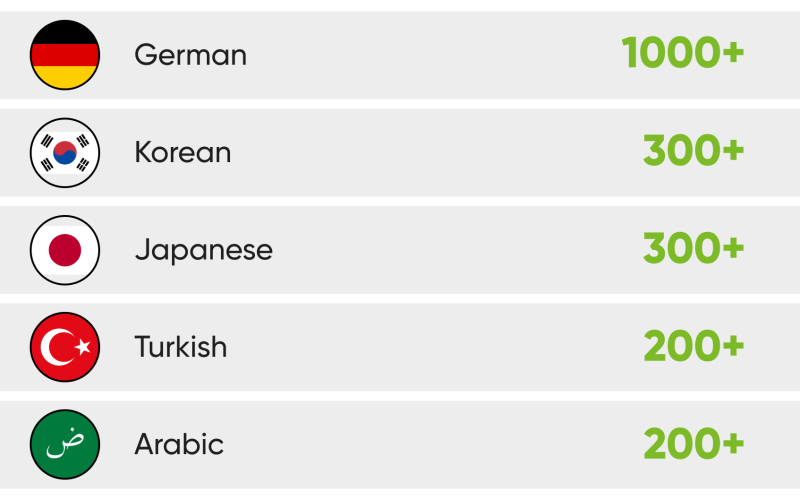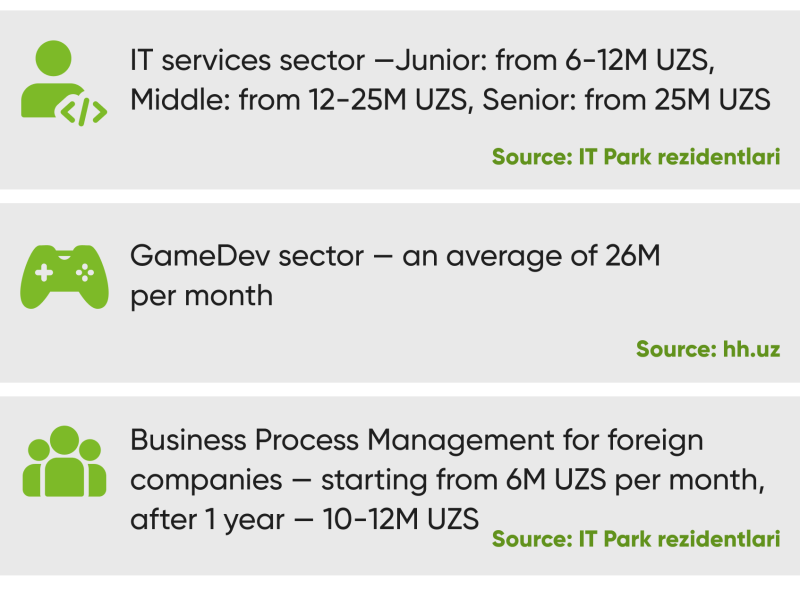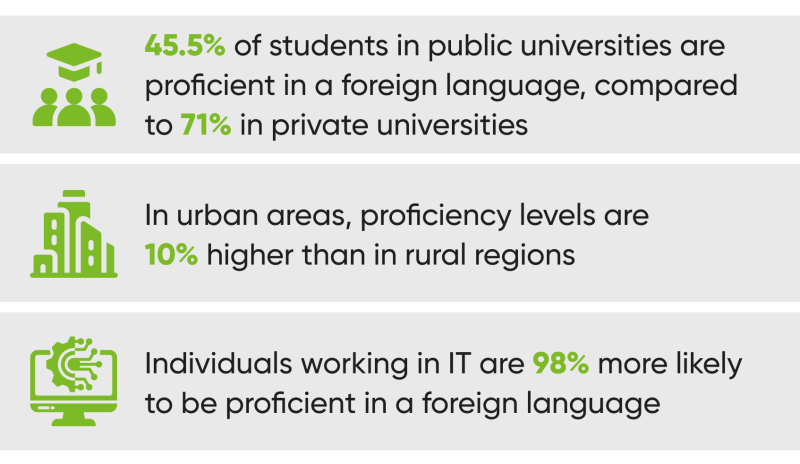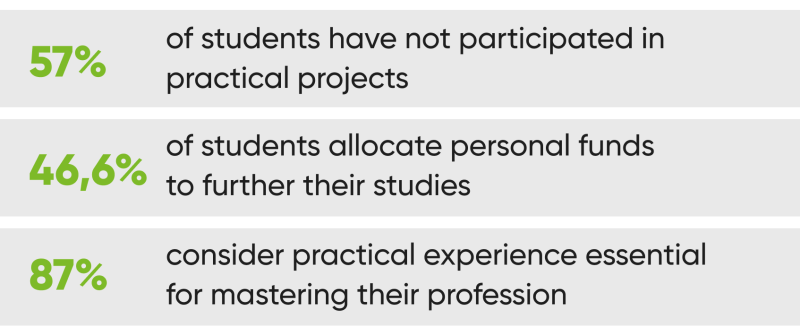
Foreign Languages: Your Superpower in the ITes Sector
Uzbekistan is swiftly emerging as a global IT hub, creating exceptional opportunities for conducting business in the IT-enabled services (ITes) sector, attracting prominent international technology enterprises. Global companies choosing our country open avenues for talented youth eager to establish themselves in global markets.
What does it take to become a part of this dynamic industry?
The answer is simple: proficiency in foreign languages and professional skills.
Why Are Foreign Languages the Key to Success?
The modern IT world communicates in English, from cutting-edge technical literature to communication with colleagues and clients worldwide. For professionals aiming to maintain a competitive edge, the ability to work with international resources and information is essential. If you aspire to be part of an international team, participate in large-scale projects, and gain access to the best knowledge, foreign language proficiency is your gateway.

Significantly, the IT sector is not confined to technically skilled professionals. Numerous positions are available for communicative and determined young people, such as software testers, technical and customer support specialists, designers, marketers, and more. This diversity ensures that everyone has an opportunity to carve out a niche in this industry.
For those proficient in English and aspiring to embark on an international career, Uzbekistan provides the chance to work with foreign companies and enrich their portfolio with prominent global projects — all while staying within the country.
_1736528566.png)
In today's world, the demand for multilingual specialists is growing, and proficiency in multiple languages is crucial for a successful career in international companies. In addition to English, the most in-demand languages are German, Korean, and Japanese. Foreign companies increasingly prioritize candidates with proficiency in these languages at a C1 level and English at a B2 level, making such specialists more competitive and sought after in the job market.
For working with clients from English-speaking countries, a C1 level of English proficiency is required. Below is the number of such vacancies by language:

Japanese companies, including Sunnydays, ACES Japan, Toybeez, and Alex Solutions, actively seek IT and BPO specialists from Uzbekistan who possess advanced Japanese language skills (B2 level and above). The following positions are currently in high demand: Middle Project Manager, Senior Software Engineer, HelpDesk Specialist and Frontend Engineer.
It is important to note that positions in ITes companies focused on international markets are highly remunerated:

Salaries in the IT sector are above the national average in Uzbekistan, clearly indicating the rapid growth of the ITes sector and the exciting opportunities it offers to youth for both earning potential and career advancement within the country.
Development of Language Skills for IT Specialists in Uzbekistan
Currently, Uzbekistan hosts over 500 language centers, providing affordable opportunities for young individuals to learn English and other foreign languages. For instance, the average monthly cost of such courses is a modest 464,000 UZS — an investment that promises substantial career prospects in return.
Furthermore, there are more than 490 educational institutions in the IT sector offering over 1,300 specialized courses. At present, these centers are educating over 4,700 students, while 32,200 individuals have already completed their studies, among whom 12,500 have successfully secured employment. These statistics underscore the fact that acquiring knowledge and skills creates pathways to international opportunities.
Nonetheless, language proficiency alone constitutes just one piece of the puzzle. Practical experience gained through project-based work, internships, and participation in workshops is vital for transforming theoretical knowledge into applicable expertise. Research conducted by IT Park Uzbekistan and the Center for Progressive Reforms reveals that only 45.5% of students in state universities possess foreign language proficiency, whereas this figure rises to 71% among students in private institutions and branches of international universities.
Reforms aimed at enhancing the educational system have significantly improved foreign language proficiency among the youth. For instance, individuals aged 18–20 exhibit 61% higher proficiency levels compared to those in the 31–35 age group. However, disparities in teaching standards persist between regions, with urban areas demonstrating a 10% higher proficiency rate in foreign languages compared to rural areas.

Challenges in Learning Foreign Languages
While learning languages is crucial, it is not sufficient on its own. The ability to apply acquired knowledge in practice is equally important. However, surveys indicate that 57% of students have never engaged in real-world projects through internships or workshops. As a result, 46.6% of students feel the need to invest their own funds to gain additional practical knowledge and experience.
This is not surprising, as 87% of students assert that practical experience contributes to better mastering a profession. Theoretical knowledge alone offers limited value unless it is applied in real-life situations. Practical training is not merely an academic pursuit — it is preparation for the challenges of the professional world and the foundation for a successful career.

Uzbekistan is currently taking crucial steps to address the gap between theoretical knowledge and practical experience. Efforts are underway to establish partnerships between universities and ITes companies, facilitating joint educational projects and commercial ventures. This will allow students to not only study theory but also actively engage in real-world projects. This model has already proven successful in countries such as the United States, where the Industry-University Cooperative Research Centers program has led to an increase in graduate employment within their respective fields.
In line with Presidential Decree № PD-157, dated October 14, 2024, IT training centers, as members of IT Park, have been granted the ability to offer language courses, including professional terminology. This initiative will enable the youth of Uzbekistan to communicate confidently with international colleagues and enhance their competitiveness in the global labor market.
Furthermore, under the same decree, IT Park Uzbekistan members are authorized to train specialists in Business Process Outsourcing (ITes). This sector is expanding career prospects for young professionals, making them globally in demand.
One of the successful projects already launched is a collaborative program between IT Park Uzbekistan and MAAB Innovation, which has introduced training in the highly demanded field of Business Intelligence (BI), creating new opportunities for career growth in Data Analytics and Data Engineering. This program combines theoretical education with practical skills, focusing on preparing internationally competitive specialists capable of working on large-scale projects directly from Uzbekistan. Participants are assured of high-quality education under the guidance of experts, learning essential BI tools and gaining prospects for employment with leading global companies.
_1736528420.png)
Thus, Uzbekistan is creating unparalleled opportunities for its youth, laying a robust foundation for their future success. Proficiency in foreign languages has evolved into a crucial asset, serving as a powerful tool that facilitates access to international markets, participation in large-scale projects, and the establishment of connections with prominent global companies. Now more than ever, it's time to act, leverage this potential, and become part of global progress.
If you are proficient in foreign languages and aspire to work with an international company, fill out the form and take the first step towards a career that will open global horizons and offer exceptional opportunities for professional growth.
2025-01-10
